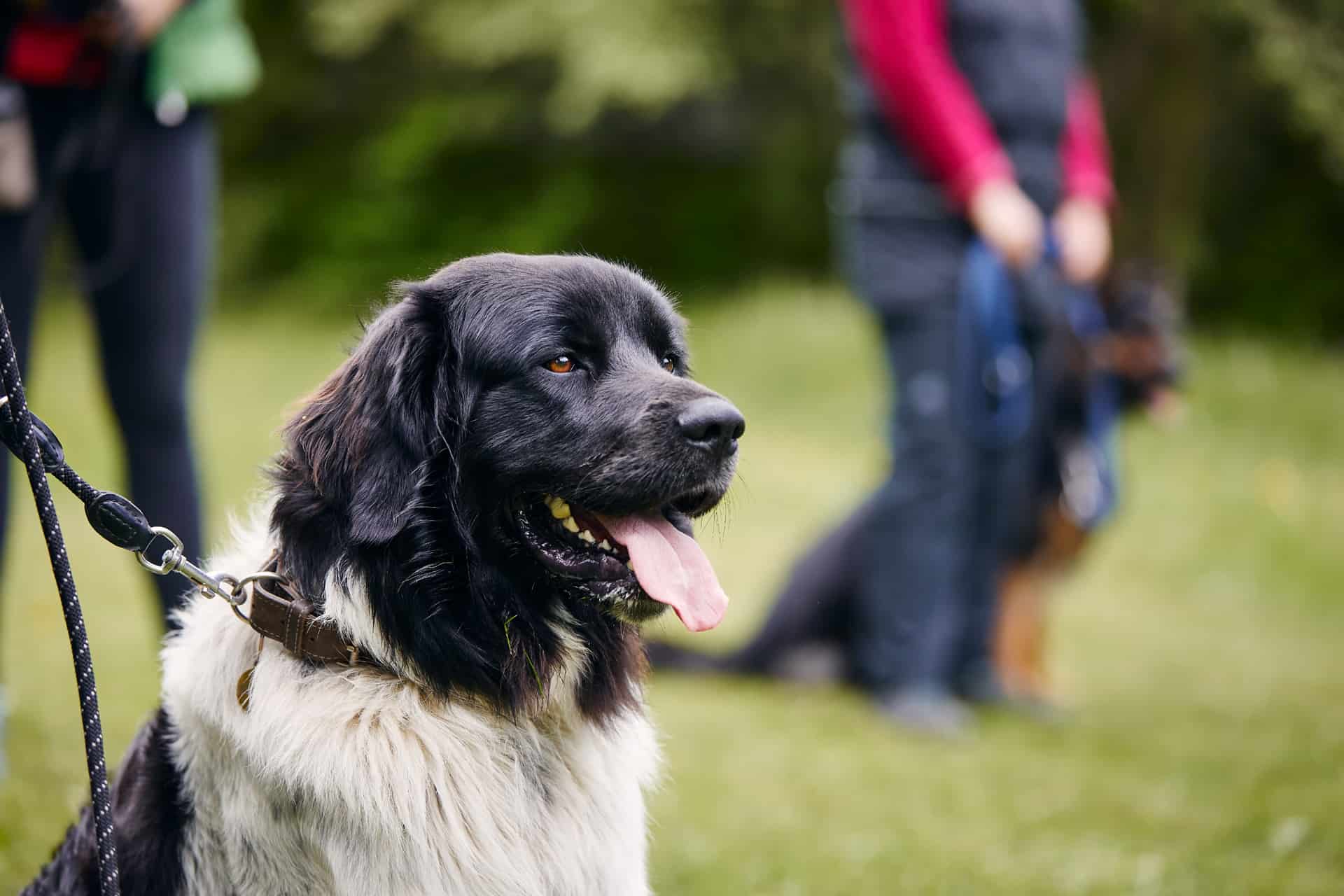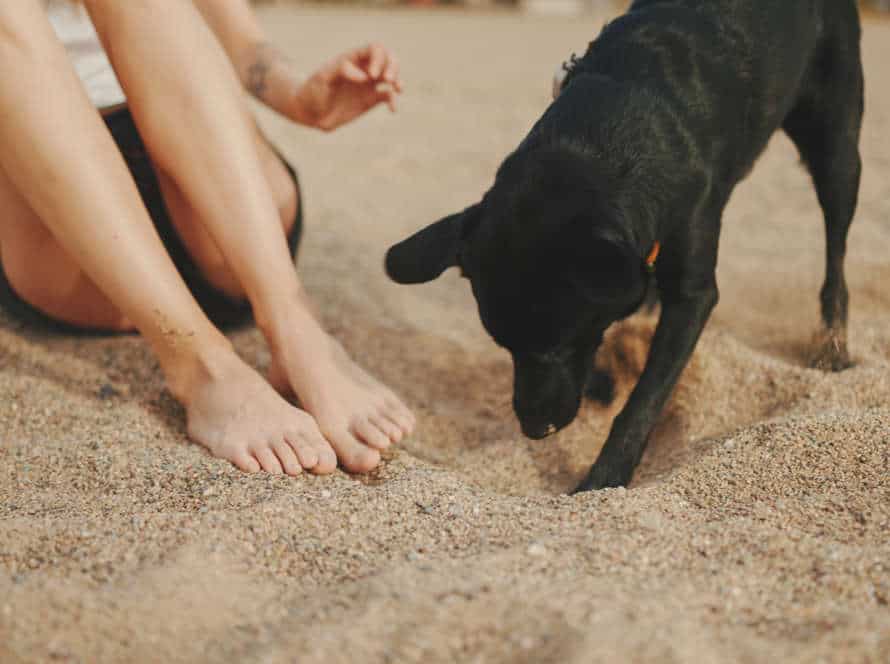The Benefits of Obedience Training in Preventing Digging Behavior
Obedience training is a great way to stop your pup from digging holes. It can help them stay calm and content around you and others. Here are some of the benefits:
- You’ll have more control over their behavior. With proper training, they’ll respond to your commands and you can redirect them away from digging.
- Training exercises their brain and reduces boredom, so destructive behaviors like digging won’t happen.
- Socializing your dog during training can make them feel safe and more comfortable with strangers and other dogs, reducing the chance of digging due to anxiety.
- Positive reinforcement during training will replace bad behaviors with good ones, making them more likely to do activities you prefer.
Obedience training is key for preventing digging. Pro tip: Use treats or praise when reinforcing good behavior!
Understanding Digging Behavior in Dogs
Digging is a typical habit for doggos. But, it can be an issue if not managed properly. Knowing why pups dig and how to stop or handle it is vital. Obedience training is a successful way to do this. In this article, let’s explore the advantages of obedience training and how it can stop digging behavior in pooches.
Reasons why dogs dig
Digging is a natural instinct for dogs. There are various reasons why they dig holes in your yard. For example:
- Boredom and excess energy. Dogs that don’t get enough exercise or mental stimulation might start digging.
- Hunting instincts. Dogs with a strong prey drive may be trying to chase small animals.
- Comfort and temperature regulation. They may dig for a cool spot or a warm den-like atmosphere.
- Separation anxiety. Digging helps them relieve stress when left alone.
Obedience training can help discourage digging behavior. It can teach them other activities and reinforce good behavior. If the problem persists, seek help from a professional dog trainer.
Behavioral problems associated with digging
Dogs like to dig, but too much can be a problem. Reasons include boredom, anxiety, instinct, comfort or burying things.
Behavioral issues linked to digging:
- Trying to escape: Digging a lot under fences or gates might be a sign of boredom or worry.
- Aggression: Growling/snapping when stopped can be aggression requiring obedience training.
- Destructive behavior: Digging up plants, furniture or other items suggests extra energy is being used destructively.
Obedience training can help with these problems and stop excessive digging. Teaching “stay” and “leave it” redirects attention and provides mental stimulation. Keeping active with toys and puzzles satisfies the need to dig, preventing boredom.
Pro tip: Give your dog a dedicated digging area in the back yard.
Understanding your dog’s personality and needs
Knowing your pup’s character and needs is essential to give them the care they need. Digging is natural for dogs, but can be harmful if not managed properly. Training is a great way to stop unwanted digging behavior. Here are some advantages of obedience training:
- Strengthen good behavior: Puppy training helps to reinforce good conduct, like fetching a toy instead of digging in the backyard.
- Offer mental stimulation: Training can help provide mental stimulation to reduce a dog’s wish to dig out of dullness.
- Improve the bond between the owner and the dog: Training can improve the connection between the dog and its owner.
By understanding your pup’s natural behavior and needs, you can teach them to show their needs in good ways, avoiding undesirable digging behavior. Pro Tip: Positive reinforcement is key to success. Always reward good behavior and skip physical punishment.
How Obedience Training Can Help Prevent Digging
Every pet parent wants their furry companion to be well-behaved and obey their commands. Obedience training is a vital part of teaching your pet how to behave correctly. It can also help prevent destructive habits, like digging. We’ll look at how obedience training can stop your pet from digging in this article.
Teaching obedience commands to redirect behavior
Obedience training is a great way to stop your pup from digging up your garden or backyard. To train your dog, follow these steps:
- Start with basic commands like “sit,” “stay,” and “come.”
- Use rewards like treats, praise, or toys to encourage your pup when they obey the commands.
- Gradually make the training more difficult by changing the environment.
- Add training to your pup’s daily routine until it becomes a habit.
Training helps redirect their energy and prevents destructive behavior. Plus, it strengthens the bond between you and your pup, improves communication, and builds trust.
Pro Tip: Consistency, patience, and positive reinforcement are key for successful obedience training.
Positive reinforcement techniques to discourage digging
Positive reinforcement is a great way to stop your pup from digging. Obedience training can help your dog focus on positive activities. Here’s what you can do:
- Redirect them. Call their name when they start and distract them with a treat or toy.
- Reward the good. Praise or give a special treat when they choose not to dig.
- Keep an eye. Watch for signs of digging and intervene before it starts.
- Exercise. Boredom and too much energy can lead to digging, so make sure your pup gets enough playtime.
- Designated area. Make a spot in the yard for digging and hide treats and toys to encourage them.
Obedience training can strengthen your bond and help your dog have confidence. With consistent training and positive reinforcement, they’ll engage in more suitable activities than digging.
Tip: Always reward good behavior to discourage bad behavior.
Consistency and repetition of training methods
Consistency and repetition are vital for training a pup, especially to stop digging. Obedience training is an efficient way to stop unwanted behavior, like digging, in dogs. Here are the advantages of obedience training to prevent digging:
- It reinforces good behavior: With obedience training, canines learn what is expected from them and the correct reactions to commands. This helps them to understand what is allowed and what is not, reinforcing good behavior and lessening the chances of them doing anything destructive like digging.
- It improves communication: Obedience training helps to get better the communication between pet owners and their furry friends. When communication is better, dogs are more probable to listen to commands and react in a positive way.
- It gives mental stimulation: Training activities provide pups with necessary mental stimulation, avoiding boredom, tension, and stress, which are usually the main causes of destructive behavior.
Training with positive reinforcement is the most effective way to lessen digging and enhance your dog’s behavior in general. Pro Tip: Consistency is key when it comes to dog training. Training your pet regularly creates routine and guarantees that they stay up to date with their training.
Professional Training Options for Preventing Digging
Obedience training can be a great way to prevent and manage your pup’s buried digging behavior. Professional dog trainers can step in to help you figure out why your pup is digging, and teach him more appropriate behaviors. This article will explore the professional training options available to help you address your pup’s digging behavior.
Group obedience classes
Group obedience classes are a great way to tackle and avoid digging behavior in dogs. They teach dogs basic commands and good behavior, while providing a monitored space to practice these behaviors.
Attending obedience classes help dogs learn discipline, respect, and socialization skills, which stops destructive behaviors like digging. Moreover, it strengthens the bond between dogs and their owners, making it easier to communicate and redirect unwanted behaviors.
In these classes, dogs interact with other breeds and personalities, further assisting them in understanding how to act with other dogs. In addition, some classes may focus on preventing digging behavior through positive reinforcement techniques.
All in all, group obedience classes provide a secure and controlled environment for owners to address and prevent destructive behaviors like digging.
Private obedience training
Private obedience training is a great way to stop your dog’s digging, while also making them more obedient. It has many advantages, like:
- Personal focus: A professional dog trainer can adjust the instructions to your dog’s needs and learning style.
- Unique plan: The trainer can create a plan to fix your dog’s digging and other issues.
- Faster results: With individual attention and a targeted approach, it can get better results than group classes.
By training your dog, they can learn good behaviors and become happier and healthier. Pro tip: Be consistent with the training and praise to get the best results.
Utilizing the expertise of a professional dog trainer
Getting help from a pro dog trainer can stop your pup from digging. Obedience training is a great way to avoid bad habits and promote good ones. Here are 3 ways a trainer can help:
- Obedience training – teaches your dog to understand commands and behave. Establishing a leader/follower relationship and using positive rewards will help your dog respect boundaries and act appropriately.
- Behavioral training – uses positive reinforcement like clicker training, desensitization and counterconditioning to change certain behaviors.
- Agility training – fun for your pup and good exercise. Obstacle courses that involve jumping, running and weaving keep them entertained and happy.
Working with a professional dog trainer can create a program that meets your pup’s needs and stop digging before it becomes a problem.
Implementing Environmental Changes to Prevent Digging
Digging can be a bothersome issue for pet owners. But, with the correct approach, it is possible to reduce or stop this behavior. Environmental changes and obedience training are two methods to address pets digging in the garden or indoors. This article will discuss how utilizing environmental changes plus obedience training can help curb digging.
Limiting access to certain areas of the yard
Limiting access to certain areas of the yard is a great way to stop dogs from digging. Use physical barriers like fencing to block off spots where digging isn’t allowed. Here’s what to do:
- Identify the areas that are off-limits.
- Put up physical barriers, like fencing or big rocks.
- Make sure the barriers are firmly in place and can’t be moved or dug under.
- Show the dog where it can safely dig and play.
- Obedience training can also help discourage digging. Teach commands like “sit” and “stay” to show you’re the pack leader and stop unwanted digging.
Providing designated digging areas
Designating a digging area is a great way to stop your pup from ruining your yard and garden. Dogs love to dig, so providing them with an area for it will focus their energy and prevent destruction. Here’s how to create their own spot:
- Pick a section of your yard you don’t mind them digging in.
- Loosen the soil and add sand or mulch to make it more inviting.
- Hide toys or treats in the area to encourage them to dig.
- When they start to dig elsewhere, use positive reinforcement to direct them to the designated area.
- You can also use obedience training to stop problematic digging. Positive reinforcement and reward-based learning will help your dog understand limits and promote good behavior. This training will help improve their behavior overall.
Providing toys and mental stimulation for your dog
Toys and mental stimulation are important for your pup’s physical and mental health. Here’s how to keep them stimulated and minimize destructive digging in the home:
- Interactive Toys – Puzzle feeders or interactive toys can get your pup thinking and reduce their stress levels.
- Chew Toys – Natural chewing is safe and durable with appropriate chew toys.
- Training – Obedience training teaches commands and problem-solving skills.
- Environmental Changes – Designated areas for digging in the yard and sandboxes help curb their digging.
These simple changes plus providing toys and mental stimulation result in less destructive digging and better overall well-being for your pup!
Potential Consequences of Ignoring Digging Behavior
Digging – if left unchecked – can be a tough thing to manage. Not paying attention to it may cause even more damage to your yard or garden. Plus, your pet or other animals in the area could be hurt. Get smart about your pet’s digging habits. Obeyance training might be the answer.
Property damage and safety hazards
Digging by pets can lead to property damage and safety issues. If your pet is displaying this behavior, act quickly to stop possible outcomes. These are:
- Escape from the yard: Digging can make openings in fences, allowing pets to get away.
- Injuries: Holes and uneven ground can cause injury to pets and people.
- Damages: Electrical wires, sprinkler systems and utility lines can be broken by digging, leading to costly repairs.
Obedience training can stop destructive digging. Teach your pet commands like “no” and “stay” to protect yourself and your belongings.
Pro tip: Give your pet interactive toys and physical activities to reduce digging behavior.
Negative impact on the bond between dog and owner
Neglecting your pup’s digging can harm the bond between you two. It’s natural for canines to dig; yet it can cause distress to owners. Digging can damage lawns, gardens and backyards, leading to frustration. Unchecked digging can generate aggressive or anxious behavior in dogs.
You can prevent digging through proper obedience training. Guide your pup not to dig in certain places and create specific digging areas. Teach commands like “stay” and “leave it” to control digging. Give your pup positive rewards when they obey – treats or praise – to strengthen the bond.
Negative impact on the dog’s mental and physical health
Ignoring your pup’s digging conduct can have a negative effect on its mental and physical wellbeing. It’s a typical conduct for dogs, but it can get out of hand when it gets excessive and destructive.
Mental Health:
Dogs that are left alone for long and don’t get stimulation or playtime may resort to destructive digging as a form of amusement. Neglecting this can cause severe boredom, stress, and despondency.
Physical Health:
Digging can be harmful to your pup’s physical health too. It can bring about wounds like cuts and scratches, broken nails, or even broken teeth. Digging in areas with sharp items or toxic dirt can harm your furry companion.
Obedience Training:
Training your dog to obey basic commands like “sit”, “stay” and “leave it” is highly encouraged to stop destructive digging. This will teach them to redirect their vitality towards activities that are satisfactory.
Pro Tip: Regular exercise and playtime plus obedience training can keep your dog mentally stimulated and help it lead a healthy and happy life.
Conclusion: The Importance of Obedience Training in Preventing Digging
Obedience training is key to stop digging in dogs. Through positive reinforcement and teaching it, owners can help their pup learn better. Plus, obedience training reduces stress related to difficult behaviors like digging. This article explains how obedience training prevents digging in dogs.
Recap of the benefits of obedience training for preventing digging behavior
Obedience training is a must for stopping digging habits in dogs. Here are the advantages:
- Obedience training builds trust and respect between the dog and the owner. This helps owners to interact with the dog and show them the correct behaviour and orders.
- It can help fix any issues with the dog that may be why they are digging, such as worry or being bored.
- Training can teach the dog to react to orders like “leave it” or “stay“. This can stop them from digging in places they shouldn’t.
In conclusion, obedience training is a humane and effective way to prevent digging while strengthening the connection between dog and owner.
Encouraging dog owners to seek out professional training resources
Digging can be a common problem for pooches. But, with the right obedience training, it can be prevented. Professional trainers can give you the tools you need to create a personalized plan for your pup. Here are some of the benefits:
- Improved communication between you and your pup, so you can better understand why they may be digging.
- An understanding of your dog’s needs and how to meet them.
- Mental stimulation and physical exercise, which can reduce the likelihood of digging.
Obedience training builds trust and discipline. With the help of professional trainers, you can ensure your pup is well-behaved and happy. Plus, it’ll stop them from digging!
Tip: Find certified and experienced trainers for the safety of your pup during training.
Emphasizing the importance of positive reinforcement and consistency in training.
Positive reinforcement and consistency are essential for obedience training. This means rewards and praise to encourage good behavior, rather than punishing bad behavior. It will help promote good habits and build trust between the pet and owner.
Consistency is also important. Train regularly and in the same way each time. This stops confusion and reinforces the desired behavior.
Obedience training gives many benefits. A better-behaved and obedient dog, a strong bond between owner and pet, and a safer home for both.
If digging behavior is noticed, act quickly and consistently. This stops it from becoming a habit. Positive reinforcement and consistency will help prevent digging behavior in your furry friend.
Frequently Asked Questions
Q: What is obedience training for dogs?
A: Obedience training is a method of teaching dogs basic commands and behavioral skills, such as sitting, staying, and walking on a leash.
Q: How does obedience training help prevent digging behavior?
A: Obedience training can help prevent digging behavior by teaching dogs alternative ways to release their energy and establishing clear boundaries for what is and isn’t acceptable behavior.
Q: What are the benefits of obedience training?
A: The benefits of obedience training include improved communication between dogs and their owners, increased bonding and trust, and improved behavior and obedience skills.
Q: Can obedience training be done at home?
A: Yes, obedience training can be done at home with the help of online resources, books, or a professional dog trainer who can provide virtual coaching.
Q: When is the best time to start obedience training?
A: The best time to start obedience training is when a dog is young and still developing their behaviors and habits, although training can also be effective for older dogs.
Q: How long does it take to see results from obedience training?
A: The time it takes to see results from obedience training depends on the individual dog and the consistency of training. However, most dogs start to show progress within a few weeks of consistent training.







